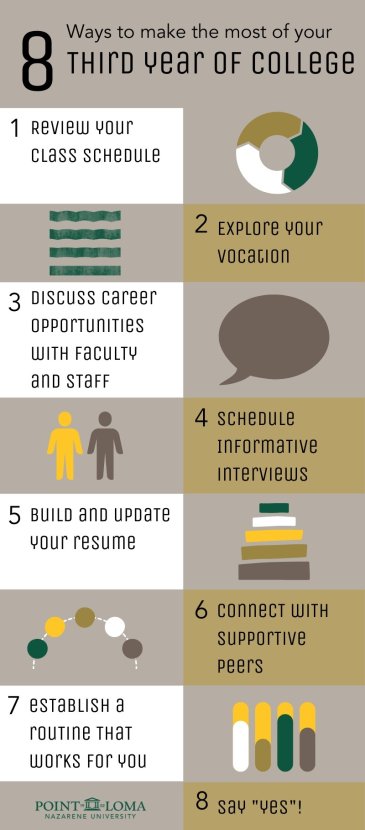
From elated and inspired to anxious and bewildered, a plethora of emotions may arise during your third year of college. And you know what? This is totally normal.
College is brimming with self-exploration, knowledge expansion, and career preparation. This can be overwhelming at times, especially when you hit the halfway mark. Junior year entails an increased workload, watching friends graduate and enter the workforce, and preparing for your own professional career.
8 Tips for Success
Whether you’re set on your educational path or are in the midst of re-evaluating it (which is still okay to do during and after your junior year), here are eight tips to help you make the most of your third year.

1. Review your class schedule
On your own
With most of your lower-division classes complete, the following semesters will include upper-division courses. As these courses are more demanding, consider when it would be best for you to take them. If you have an internship, study abroad program, sports season, or extracurricular during one semester, consider taking more challenging classes at a different time.
With an academic advisor
Some courses may only be offered in certain semesters, which can pose a challenge when you register for classes. For this reason, junior year of college is a great time to meet with your academic advisor. They can help you review your class schedule and make sure that you’re on track to graduate.
Most colleges have academic advisors in each department. Advisors can provide you with an advising sheet that recommends when particular classes should be taken.
At PLNU: Department Chapel
Once a semester, each department at PLNU hosts a Department Chapel. Undergraduate students of the same major are presented with course updates, experience opportunities, and resources they need to chart an academic path that aligns with their interests, skills, and long-term career goals.
2. Explore your vocation
College is a great place for you to explore your vocation. They offer a wide range of extracurricular activities that cater to various interests. With two years left until graduation, utilize this time to dive into different hobbies, meet people with similar interests, and find what makes you feel the most fulfilled. Doing so may lead to the realization that you want a career that aligns with your vocational calling.
For example, a biology major’s love for volunteering with youth may turn into a desire to teach science. Or a psychology major who loves to write and share others’ stories may realize that journalism is a more satisfying career.
Below are some college experiences that will help you explore your vocational calling:
- Clubs
- Associations
- Volunteer experiences
- Intramural sports
- On-campus jobs
3. Discuss career opportunities with faculty and staff
You’ve spent many hours in the classroom learning from professors and faculty, but it doesn’t have to stop there. University faculty members are often experts in their fields. They have a wealth of knowledge and experience related to career paths and opportunities associated with their department.
Discussing career opportunities with faculty members is an invaluable opportunity for upperclassmen, as faculty members can provide insights into:
- Job prospects
- Specific industries
- Emerging trends
- Research opportunities
- Graduate programs
Establish a relationship and respect
Establishing a solid relationship with your professors is key if you’re looking for professional guidance about a particular industry. Submitting assignments on time, attending class, and actively participating will show faculty members the respect you have for both them and your personal and professional development.
With knowledge of their students’ strengths and interests, professors can also serve as mentors — providing suggestions for internships, relevant courses, and extracurricular activities. This could also lead to networking opportunities, as they often have extensive connections within their fields through:
- Professional organizations
- Alumni networks
- Other faculty and staff members
- Inner-field connections
4. Schedule informational interviews
Reaching out to a current working professional in your field of interest is a great way to network and learn about a career. Scheduling informational interviews enable individuals to establish connections and better understand where they may occupationally thrive. It is also a way for you to gather insider information on a position’s day-to-day responsibilities, internal communication, and trajectories.
Although it may seem daunting, remember that we’re all lifelong learners, and these employees were once students too.
Here are some ways you can connect with professionals who are working in your field of interest:
- Ask your professors, department chairs, or staff members in your university’s career services if they know alumni or local professionals.
- Message current professionals on LinkedIn, or your university’s specific alumni connection page, and ask them for an informational interview.
- Reach out to your university’s Alumni Association and see if they can connect you with an alumnus who shares common interests or career goals as you.
- Connect with or apply to become a Student Alumni Ambassador.
5. Build and update your resume
Job experience
Junior year is a great time to pursue internships and entry-level positions in your chosen field. Doing so will help build your resume. For example, a psychology student might start working as a behavioral technician, where they help clients with day-to-day activities. Or an accounting student might intern at a nonprofit, where they help people below the poverty line file their taxes.
These roles will equip you with hands-on experience before you earn your diploma, making you a strong candidate for future employers.
Skills, accolades, and more
With each project, course, volunteer experience, and activity, you will acquire new skills and knowledge. Mentioning these skills in your resume will demonstrate to employers your diverse range of competencies.
Include any honors and awards earned during your undergraduate degree. This will help you stand out to future employers.
Benefits of updating your resume:
Quicker application process
Throughout your college career, you may encounter part-time jobs, internships, or other experiences that correspond with your career goals. Updating your resume regularly ensures that you can quickly apply for these opportunities and spend more time on other components of job applications, such as a cover letter or a list of references.
Easier to tailor for job applications
There are specific requirements and preferences for each job opportunity and industry. Updating your resume on a regular basis will make it easier for you to tailor when starting a new application.
6. Connect with supportive peers
The third year of college is often a critical time when students face various challenges, such as career planning, an increased academic workload, and other personal development. Connecting with supportive peers who are the same major or year can provide a sense of understanding and camaraderie.
Collaborating with fellow students can also help you:
- Deepen your understanding of a course’s material
- Achieve better academic outcomes
- Enhance your problem-solving skills
Another way to make the most out of college is by creating study groups with these supportive peers. Maybe you’ve known them since your sophomore or freshman year, or maybe you’ve just met them. Regardless, leaning on them for academic and personal encouragement can help enhance your college experience.
7. Establish a routine that works for you
The college experience grants you more personal freedom with your schedule. Although late nights out with friends and making plans on a whim can be fun, doing so excessively may pull you away from your studies, adequate sleep, and a sense of control. Establishing a routine that balances your academics, social life, and personal well-being, can reap many benefits, such as:
- Reducing stress
- Improving time management skills
- Enhancing productivity and self-discipline
- Feeling more focused
Establishing a routine is important during your junior year of college. It can make your transition into the professional world smoother and help you maintain a work-life (or school-life) balance. Research has also shown that routines can play a valuable role in mental health. One study, for example, found that routines can help people manage stress and anxiety better.
However, we all operate differently and have our own definitions of routine. Some people find it easier to have a structured daily schedule, while others prefer to have a daily to-do list. When deciding which approach is best for you, consider what motivates you and what tasks have the highest priority.
8. Say “yes”!
With an abundance of web-based learning management system notifications popping up on your phone and a full calendar, academics, and career preparation may be at the forefront of your mind. While it’s important to stay attentive to work and school, so is taking time to nourish your soul.
From playing recreational sports and weekend getaways to late-night movies and Target runs with your roommates, college is a time of countless enjoyable experiences. Take advantage of those opportunities!
Prioritize saying “yes” when you’re invited to hang out with friends or try something new. Briefly stepping away from the textbooks to embrace the last two years of your college career will help you achieve a healthy balance between personal, academic, and professional pursuits. If you find yourself feeling overwhelmed by the future, remember that it’s okay and life has a way of working itself out.
Get started at PLNU
If you’re looking for other tips to make the most of your time at PLNU or for more college tips, check out PLNU’s Career Services.